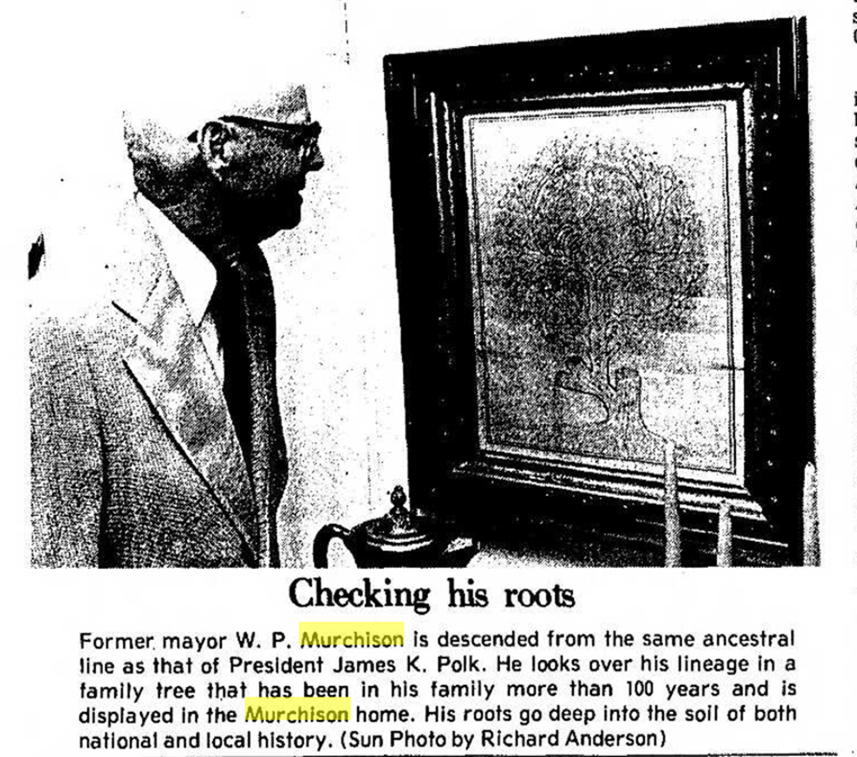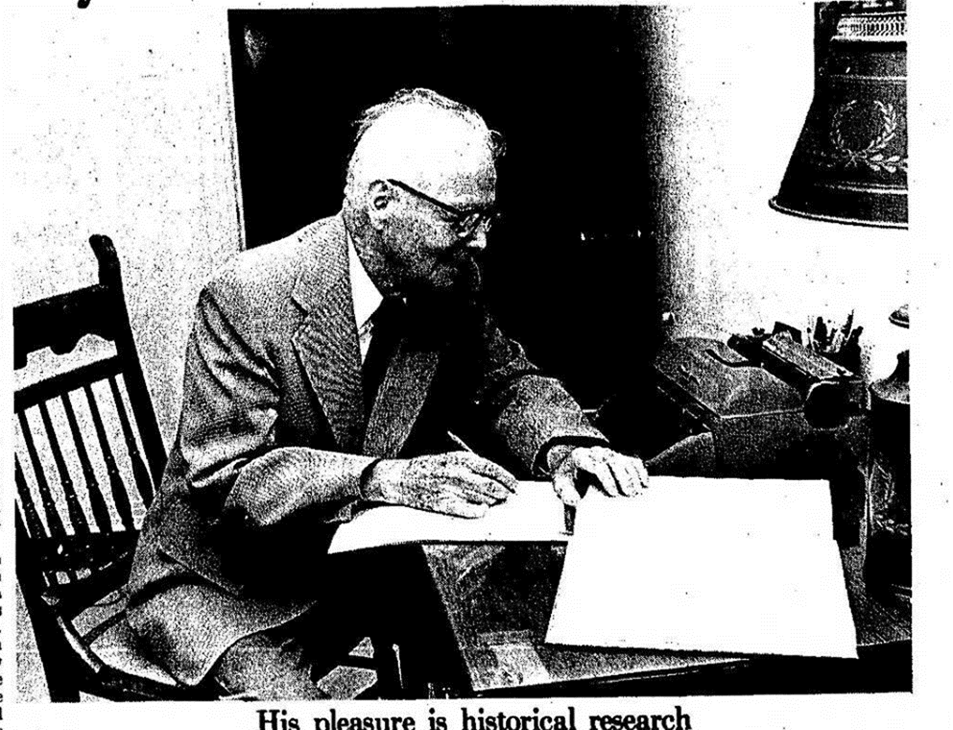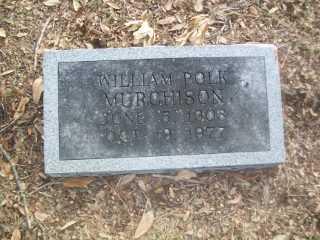|
William Polk “Billy” Murchison
Jan 5, 1908 - Oct 19, 1977




By Jewel Gibson
No wonder William Polk Murchison Sr.is a history buff. Born in Corsicana in
1908, young Billy was reared on historical tales that captured and held his
imagination.
For example, there was Uncle Monroe Polk, his grandfather’s brother, who used to
relate exciting stories about his escapades during and after the Civil War era.
Wounded by a half-inch miniball that lodged in his skull, “Uncle Mon: had skull
surgery in 1863.
“The doctor had to use a hammer and a chisel to retrieve the ball,” he used to
tell young Billy.
(Murchison has in his possession a miniball the type and size of the one that
was taken from his uncle’s skull.)
“Uncle Mon” used to tell how he tried to continue his service in the Confederate
Army after his hospitalization; but the army would not let him take any further
part in the war. “Uncle Mon,” however did not give up. He joined a group of
raiders and helped scour the countryside for food for his undernourished
comrades. Finally, the Yankees captured “Uncle Mon” – a real adventure tale.
The uncle was not the only story teller in young Billy’s family. Nobody could
spin a yarn better than his grandmother Polk.
The story that titillated young Billy most was the one his grandmother used to
tell him about what happened one evening – long ago – when Billy’s
grandfather-to-be came courting her in Hernando, Miss. during the Civil War.
MRS. POLK ALWAYS referred to the man she married – William A. Polk – as Mr.
Polk. The story as she told it went something like this: “Mr. Polk was too young
to join the army – only 16; but he was not too young to be a regular visitor at
our house. One evening when he came to visit me, we had the fright of our lives.
We heard hoofbeats on the plank road that connected Hernando and Memphis. We.
Knew the Yankees were approaching our house. We didn’t know what they might do
to Mr. Polk if they laid hands on him. So Mr. Polk ran out of the house as fast
as his legs could carry him. He jumped on the horse, but that horse just wheeled
round and round, going nowhere. You see, Mr. Polk forgot to untie him from the
hitching post.”
Murchison still chuckles at the image of a scared young man on the wheeling
horse. “The Yankees didn’t do anything to my grandfather,” he said, completing
the story.
Murchison has done much research on Civil War and the Era of Reconstruction.
In his pocket he carries a little black book containing much historical
information. Some of the pages document the names of 225 Navarro citizens who
signed the petition for Texas to secede from the Union.
Taking the little black book from his pocket, Murchison red from the first
paragraph “Lincoln has been elected, and the doctrine of equality-“ Murchison
looked up from the book, lying open on his knee. “Some of the language is pretty
inflammatory,” he said.
Musing philosophically, he added, “It was a sad, sad situation – a situation
that should never occurred. We should have never owned slaves; we should have
never seceded from the Union, I feel sorry for the men that were wounded or lost
their lives and for their families, but I have to admit we brought a lot of our
trouble on ourselves.”
PICKING UP THE little black book, he read some of the names of those who signed
the petition. They included such names as Solomon Van Hook, R. Q, Mills, C. M.
Winkler, R. A. Van Horn – editor of the Corsicana newspaper – and Alexander
Beaton, outstanding citizen for whom Beaton Street was named.
Although Murchison is interested in all the history that pertains to his state
and his nation, he is particularly interested in the history of his county and
his city.
He can recall, however, a time when he would have liked to run away from the
town forever. When he was five years old, he witnessed the holocaust caused by
the explosion of nine oil tanks that belonged to the Magnolia Refinery. He
feared the whole town of Corsicana would burn up.
But from the time he was old enough to enroll in school, Murchison has been a
Corsicana enthusiast. When he was a youngster in high school, where he always
made “A’s” in history, he entered an essay contest with a theme entitled “The
History of Navarro County.”
The essay won third place in the state and was published in the Dallas Morning
News. From that time on, Murchison has been “hooked” on local history.
For 11 years he has been a member of the Navarro County Historical Society. Last
year, he was president of the organization. His last formal research paper which
he presented to the society was entitled “The Mayors of Corsicana and the
History of Corsicana City Government.”
IN THE PAPER, Murchison includes the accomplishment of his father, J. S.
Murchison, who served the city longer than any other elective official – from
April, 1925 to 1929; and from April, 1935 to 1940. J. S. Murchison was the 20th
mayor of Corsicana.
The 32nd mayor of the city was William Polk Murchison himself.
Describing himself, Murchison wrote: “By profession, I am a finance company
manager. (General American Finance.) For activities I am a Methodist, a veteran
of World War II, a member of the Chamber of Commerce, YMCA, Rotary Club, Mason
Lodge, local historical society and the Texas Ex-students Association.”
As mayor, he continued the work of street paving in East Corsicana, widened
North Beaton Street, and completed the Postoak bridge on North Commerce. During
his administration, the size of the Northwest apartments was doubled; the city
limits were extended to include the new high school area, and the James King
addition north of the Emhouse Road; a new minimum housing code was written;
voting wards were increased from 4 to 9; and a long range, comprehensive Master
Plan for Corsicana was completed.
His paper published by Governmental Service Agency is a capsule of the history
of the growth of Corsicana.
In the preface of the book, Murchison quotes a pioneer of 1860 – R. A. Van Horn,
editor of the Navarro County Express – as saying: “The habit of promiscuous
shooting is becoming quite common in our town. It is dangerous and should be
discontinued. Will our town council never organize?”
At the end of his paper Murchison observes: “As long as we have our elective
form of city Government, headed by a mayor, Corsicana will be a good city in
which to live, because under our system the mayor is a servant of all the
people.”
MURCHISON ENJOYED being mayor of all the people. A mild man of gentility, he
found the worst part of running for office was having to deal with false
accusations.
His wife Dorothy, well-known teacher of public school music, said, “I think
Billy wanted to be mayor because his father had been a progressive influence in
Corsicana, and Billy felt a sense of responsibility.”
Murchison admitted that his father’s dedication to public life had been an
inspiration to him. Besides, he said, he wanted to make a positive contribution
to his community.
As local historian, Murchison is keenly aware of the many other people who have
contributed to the making of Corsicana. He has done comprehensive research and
written papers on the history of every sheriff and every judge who have served
Navarro County.
He has not written a paper on R. D. Baylor yet, but credits him with the fact
that there are so many Baptists in Corsicana.
“Judge Baylor used to hold district court here on various Saturdays,” Murchison
said. “Well, he would hold court until about 6 p.m.; then he’d suspend court to
deliver a Baptist sermon, and adjourn with a Baptist prayer. Later, Judge
Baylor, called Brother Baylor here organized Baylor University at the site of
Old Independence.:
SOME OF MURCHISON’S many historical anecdotes picture a rough and sometimes
colorful Corsicana. For instance, there was the sheriff in the early days who
was afraid to arrest anybody who resisted him; and there was the mayor who
always brought his bottle of whiskey into the council meetings. There was also
the clever attorney who maneuvered to win a case for a family who wanted to bury
their son in the family plot – against the wishes of his wife. During the middle
of the trial, a coffin was wheeled in. at a given signal, the supposed-to-be
corpse rose up and said, “I want to be buried by my mama.” The court house was
emptied, and the wife relinquished her claim to the body.
Murchison’s roots go deep into the soil of both national and local history. He
is descended on his grandfather’s side from the same ancestral line as that of
President James K. Polk. A copy of the family tree which has been in the family
more than a hundred years hangs on the Murchison sitting-room wall. The Polk
ancestry has been traced back through Ireland to Scotland where the name used to
be Pollok.
On his mother’s side, Murchison is descended from a line of Baptist preachers.
His great-great-grandfather, Isaas Parker - son of the Rev. Ezekiel Parker – was
known as a Two-Seed Baptist. He believed that the struggle between the forces of
good and evil – as represented by God and the seed of woman seduced by the
serpent – will go on till the end of time.
“The Parkers are indigenous to this part of the state. Murchison and Cynthia
Anne Parker share a common ancestor. Still another ancestor – one on his
grandmother Murchison’s side was Samuel Haile. After the battle of San Jacinto,
Haile joined the Meir expedition at San Antonio. He was captured by the Mexicans
in Mexico and forced to wear a blindfold while he drew a bean from the famous
jar. He was lucky; he drew a white bean.
STEEPED AS HE IS in history, Murchison is presently interested in two local
historical projects.
On the committee of the Navarro Historical Society that is sponsoring the
so-called family book, Murchison is eager to see the name of every Navarro
County citizen in the book - or books, if it takes more than one book to contain
all the names.
He says he thins that Corsicana is a family-oriented city ant that families are
important; therefore, he believes that each family name should be preserved in
print.
Murchison’s next research endeavor is a plunge into the historical background of
each and every church in the vicinity of Corsicana.
:His three loves are his church, his city and his family,” Mrs. Murchison noted.
Though the Murchisons are Methodists, they have high regard for all other
religious faiths.
As parents and grandparents before him, Murchison reared his three children on
stories and legends of the past.
“He used to tell them stories at the dining table,” Mrs. Murchison said.
The Murchison’s son W. P. Jr. is an editorial writer for the Dallas News; son
Frank is a local attorney. Daughter Ann Greenhill is a resident of Fort Worth.
They have one grandchild, Ross, son of Frank and his wife.
THE MURCHISONS think you can’t beat Corsicana as a place for rearing a family.
Historically, Murchison has traces Corsicana from a “Shoot’em village” to a law
abiding city with strength and dignity.
“I believe like Thomas Jefferson that everybody is entitled ‘to life, liberty,
and the pursuit of happiness.’ I think Corsicana offers us the opportunity to
enjoy those Jeffersonian ideals.”
He says he thinks Corsicana will have reached its peak of historical perfection
when people pool their talents and their knowledge and work together for the
good of their community.
With black book in hand, Murchison will be making notations on the physical,
moral, and spiritual growth of the city that both spawned and nurtured him. He
hopes all notations will be elevating.
Notes:
OBITUARY
W. P. Murchison
Services were at 11 a.m. Friday at First United Methodist Church for William
Polk Murchison, 69, resident of Corsicana, who died Wednesday. Burial was at
Oakwood Cemetery.
Pallbearers were Maurice Young, Walter Erwin, Bob Lavender, James F. Fortson,
Tom Spikes, George Eliot, Ed M. Polk, and Halsey Suttle.
Notes:
----
W. P. Murchison
It is almost poetic that W. P. (Billy) Murchison is a part of history now,
because history was so much a part of him.
He loved history, and his love was productive. His research and writings on
history of this area will be treasured by readers and utilized by historians for
years to come.
Fellow historians honored him with two terms as president of the Navarro County
Historical Society.
Murchison played a role in history, too. The son of a former Corsicana mayor
himself, he served as city commissioner from 1966-69 and as mayor from 1969-71.
He served in numerous other public ways. And he was very active in his church,
where members who heard his Sunday school lessons will remember him as a devoted
student of the Bible.
He was a humble, meek and friendly person whose passing is mourned by all who
knew him. Surely he was the epitome of the phrase “A gentleman and a scholar.”
Notes:

WILLIAM POLK
MURCHISON
JUNE 5, 1908
OCT 19, 1977
Oakwood Cemetery, Corsicana, Navarro County, Texas
|